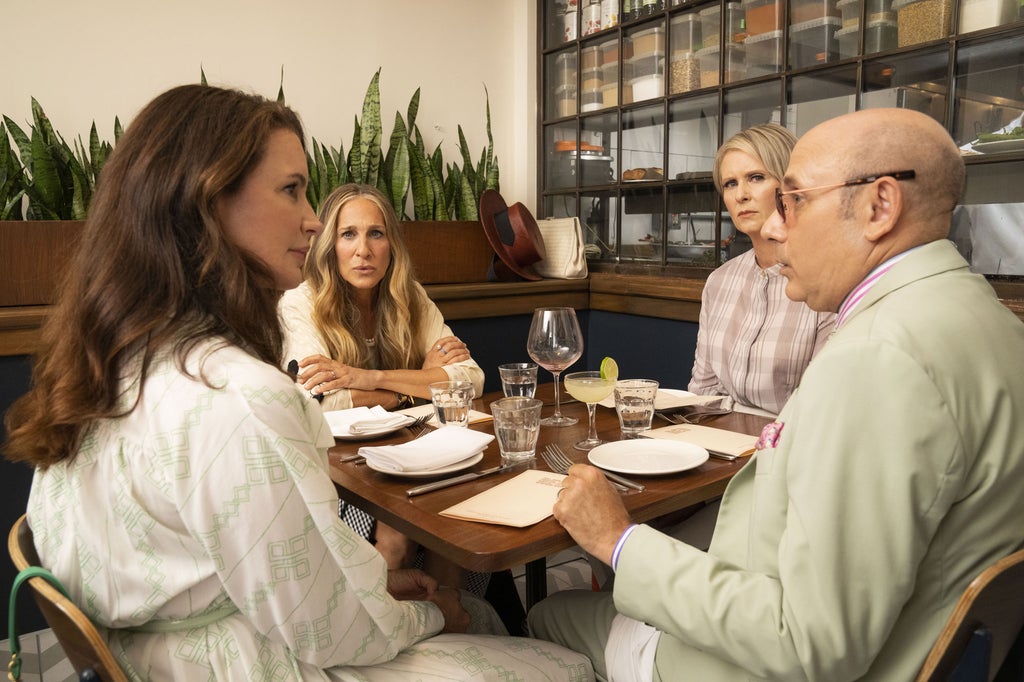Before my dad passed in August last year, I had mostly seen two grieving characters on screen. The first is the stern, silent type – usually in action TV shows – who channel the death into the form of a deeper purpose of mission. The second was the uncontrollable wailing that usually follows accidents like Lexi’s death in the dramatic plane crash in Grey’s Anatomy. It’s to be expected then that the day my Mum called me to tell me my Dad had passed, living on the other side of the world from my family in New Zealand and unable to return because of Covid restrictions, I found myself surprised that my reaction was neither of the two. What’s more of a surprise, is that over a year later I found myself relating to Carrie Bradshaw in the new Sex and the City reboot And Just Like That.
I was never necessarily a Sex and the City fan, still a child when the show first aired, but I had previously watched a couple of episodes and the movies on a plane ride or a slow TV night growing up. This means I have little attachment to the characters and can’t really weigh in on the scathing reviews and critiques that claim the characters haven’t been written accurately to the development that was built over the years the original series ran. I have, however, found myself tuning in to every episode weekly to watch the grief after Mr. Big’s character died in the first episode.

Far from Mr. Big’s dramatic death scene, my experience of my father passing was through a morning phone call in the middle of working from home in isolation. I didn’t get to break down uncontrollably like I’d seen on Grey’s Anatomy because there was a pandemic all around me and I had to text my new roommate, embarrassed, as a heads up that I might be “a little down” and email my boss to push back deadlines. Here’s where I related to Carrie.
Like Carrie, in the days after my father’s death I found myself worn out by attempting to make some friends around me more comfortable with my loss.
In episode two of Just Like That, we watch Carrie, with almost blank eyes, navigate the reality of her new situation very practically. She wakes up in an empty home for the first time, manages to get dressed and ready, and goes to funeral home viewings with Charlotte, who then breaks down and cries so much that someone at a funeral home mistakes her as the widow. While Charlotte is bawling her eyes out expressing her guilt for forcing Carrie to come to the recital the night of Big’s death, Carrie doesn’t shed a tear and instead has to console Charlotte and put her in a cab home.
Like Carrie, in the days after my father’s death I found myself worn out by attempting to make some friends around me more comfortable with my loss. On a call with a family friend, I found myself giving the “he’s in a better place” speech after she broke down while giving me her condolences, despite the fact that at that point I wasn’t sure that was true. This, says grief and trauma expert Dr. Ajita M. Robinson, is common after a loss.

“While we don’t want to centre ourselves in this situation where someone has lost their spouse we also don’t want to diminish that others are grieving as well,” she says. “If we want to be mindful of the space we might occupy we can identify support systems that are composed of people who aren’t impacted by the loss.” In other words, Charlotte should have been crying to Miranda or her husband Harry Goldenblatt.
We see this too in the most recent episode, where Carrie makes a new friendship with real estate broker Seema Patel, who didn’t know Mr. Big. Carrie does this to escape the “I’m so sorry for you’s” and pitying eyes of some of her close friends. I too remember feeling frustrated at how uncomfortable people were with my loss around me, despite the fact that I felt okay talking about it and wanted to continue to socialise. With all this in mind, it’s clear to see that (like my friends) Charlotte and Miranda care deeply about Carrie but death is often an uncomfortable conversation for most people.
It could be due to Carrie’s “heightened internal dialogue” itself (the whole basis of the first show) that her grief presents as restlessness.
Dr. Ajita M. Robinson, TRAUMA EXPERT
Another relatable thread of grief in the series is Carrie’s unrelenting pull towards doing (or “all action” as she calls it). From getting back to work to selling the house immediately, we see Carrie not in a slump but worked up. Her persistence with continuing to get out and about has led to long aimless walks (in the third episode) and uncomfortable conversations at work (in the latest episode). “You haven’t posted on social media in three weeks,” a marketer at her podcast started to berate her for, mistakenly, in the latest. Carrie’s non response felt fitting. In a culture of productivity, it can be hard to bring up grief at work. While I worked through the loss and found that helpful initially, I found myself struggling to keep up six months later and wishing modern work culture encouraged more open conversations about how non-linear grief feels. It will be interesting to see if this also happens to Carrie.

“Shock is a common response to grief but we often think this period is limited to the initial moments following a loss but we can stay in and revisit this phase,” says Dr. Robinson. “Crying is only one way to release or express one’s sorrow. Some people are emotionally expressive in their grief and others exhibit behavioral signs such as hyper-productivity. You see them ‘doing’ things often because grief creates a loss of control or because ‘doing’ allows them to honor their loved one and to feel less helpless.” Dr. Robinson also says that it could be due to Carrie’s “heightened internal dialogue” itself (the whole basis of the first show) that her grief presents as restlessness.
It is incredibly important that grief is portrayed in the media because, whether we like it or not, grief is a human experience that none of us escapes.
As a writer living in New York, a few people had previously made Carrie comparisons to me. But her ability to pay rent through one column a week, endless spending, and biphobia (as a sex writer no less) in Sex and the City always kept her feeling out of reach or unrelatable to me. In And Just Like That, it’s through grief that I’m finding some common ground in the much-loved, much-discussed series. It’s also a timely one, considering the current global loss.
“It is incredibly important that grief is portrayed in the media because, whether we like it or not, grief is a human experience that none of us escapes,” says Dr. Robinson. “If we can normalise talking about grief and how to navigate it then we can be better companions to those who are grieving.” Despite this, Dr. Robinson says she rarely comes across an accurate portrayal of grief, which would include “the joy, sadness, devastation, joy, renewed purpose and community”, not just the dips or a story of “overcoming grief”.
Approaching the second holiday since my loss, dramatic “overcoming” narratives feel less relatable to me than the portrayal of the slow changes, difficult conversations, and the non-linear emotions you feel every day after a loss. The portrayal of something you live with and are forever changed by. This, so far, to my experience rings true to Carrie. Through her lack of tears, I found comfort in the fact that most of mine didn’t come until later. Her continued drive to work has allowed me to process the guilt I felt from having to do so. And just like that, I’ve finally found a relatable storyline in Sex and the City. Here’s hoping it lasts as we continue to watch Carrie change and grow.
Like what you see? How about some more R29 goodness, right here?
Here’s How Young People Are Dealing With Grief